
Issue Six | March 2023 03 Highlights from ATU’s First Year 11 Meet our new Alumni Officer 26 International Women’s Day at ATU
Photo Credits: Mike Shaughnessy, James Connolly, Feidhlim Lally, Andrew Downes, Jessica Priddy, Sportsfile, Richard Shucksmith, Micheál Casey, Martin Leak, Adam O’Sullivan and ATU Staff.
Editor: Anne Donnelly
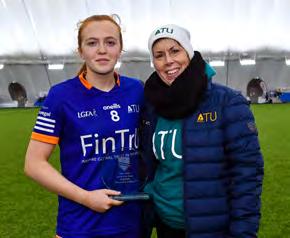
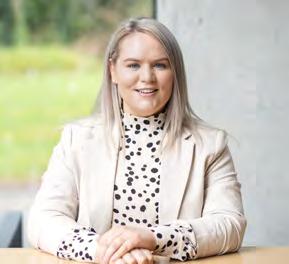

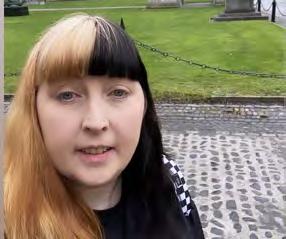
Design: The Foundation
LET US KNOW WHAT YOU THINK: email: anne.donnelly@atu.ie
University Updates
- ATU Strategic Plan Update
- Meet our New Alumni Officer
ATLANTIC TECHNOLOGICAL UNIVERSITY MAGAZINE 01 09 Welcome from the Editor 03 Our First Year - Memorable Moments - Our President Reflects on our First Year Research Round Up - Women in Academia and Research - Biodiversity and the Humble Horse Mussel - ATU and the World Technology Universities Network (WTUN)
Cover photo: ATU Donegal, winners of the Lynch Cup in the Yoplait LGFA HEC Championship, hosted by ATU Sport. They overcame UCC with the final score of 1-11 to 1-06. Photo: Sportsfile
Commiserations to ATU Sligo who narrowly missed out on winning the Moynihan Cup Final, losing to DKIT by a single point 0-11 to 2-06.
13
19
Sustainability News

- From Administrator at ATU to Swift Whisperer

- ATU joins Alliance to create European “Super Campus” across 9 EU Countries
- Invent for the Planet Competition Winners
- ATU Lecturers Travel from Donegal to Wicklow in Electric Vehicles (EVs)
Innovation and Engagement
- ATU Innovation Hub (iHub) Client Success Story
- How to Break into Human Resource Management and get Promoted
- ATU Supports Growth Within the Blue Economy Marine Cluster
- New Advancing Innovation in Manufacturing (AIM) Centre.
- ATU to benefit from €217m investment for Ireland’s Northern and Western Regions
Equality, Diversity and Inclusion News
- International Women’s Day at ATU
- Equality, Diversity and Inclusion in the Art Classroom
- ATU Collaborates with Local and Regional Bodies to Reduce Alcohol Harm
- Northern and Western Region to benefit from €5.4m European Digital Innovation Hub
- Europe’s First End-toEnd Sterility Assurance
Postgraduate Certificate Launched at ATU
- Developing Competency Training for Employees
ATU Celebrates
- ATU Marks 50 years of Toolmaking
- ATU Lecturer Selected to be the First Recipient of the Heaney-Miłosz Residency
- Culinary Successes

- Recent Student Sporting Achievements
- ATU Sport hosts the Yoplait LGFA HEC Championships 2023
- What’s happening in ATU Libraries
50
Upcoming Conferences
- Universal Design for Learning (UDL) National Conference
- DigitalEd Conference
THE FUTURE IS HERE
30
42
26
Welcome from the Editor, Anne Donnelly
Dear Reader,
I am delighted to welcome you to the 6th issue of our ATU Magazine. We are only days away from our first anniversary as a technological university. On 1 April 2022 we said goodbye to GMIT, LYIT and IT Sligo and hello to ATU. And even though we are only one year old there are many significant moments to remember. There is still a lot of work to do to make ATU the best university it can be and we are looking forward to continuing to build on what we have achieved in our first year.
In this issue we look back over some of the memorable moments of the past year and our President, Dr Orla Flynn reflects on her experience as President in year one of ATU.
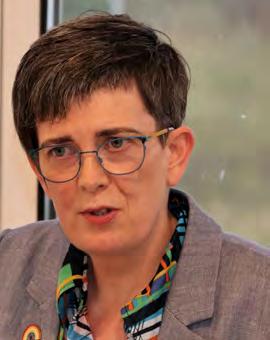
We had a lot of firsts as a university, first open days, first new student welcome programme, first conferring to name but a few. And recently we appointed our first ATU alumni officer, Lauren Reynolds who took time out of her busy schedule to talk to us on page 11.
In our research round up Jess Mannion talks to us about widening participation in higher education, and Dr José María Fariñas-Franco tells us about the humble horse mussel.
We interview ATU’s Swift whisperer in our sustainability section. Some of our lecturers travelled from Donegal to Wicklow in electric
powered vehicles and you can find out more about that on page 25.
In our innovation and engagement section we bring you news of recent activities including an event for local businesses, industry and prospective students on how to break into human resource management and an article on our collaboration with local and regional bodies to reduce alcohol harm.
Our equality, diversion and inclusion team ensured we celebrated International Woman’s Day on 8 March with a series of events to mark the day. You can find out more on page 26.
In our final section in this issue, we bring you news of a significant toolmaking anniversary and recent literary, culinary and student sports successes.
The purpose of this magazine is to keep you updated on our activities and initiatives. So, whether you’re a member of our student or staff body, or are one of our regional, national or international stakeholders, we hope you find something of interest here.
Best Wishes
Anne Donnelly
If there is anything you would like to see in future issues of this magazine, please email me at anne.donnelly@atu.ie
ATLANTIC TECHNOLOGICAL UNIVERSITY MAGAZINE 1 | Issue Six March 2023
”
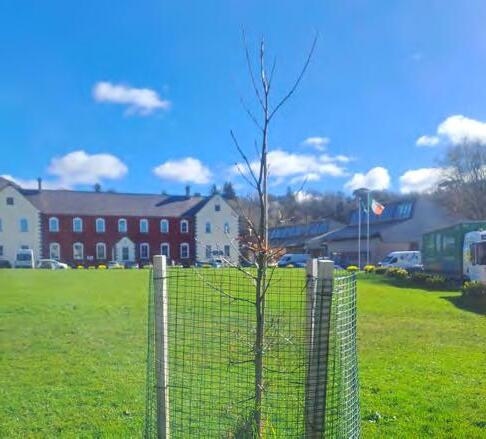

ATLANTIC TECHNOLOGICAL UNIVERSITY MAGAZINE THE FUTURE IS HERE
Issue Six March 2023 | 2
ATU Oak Tree, March 2023
Dr Orla Flynn, ATU President plants an Oak Tree in April 2022 to mark the birth of ATU.
Our First Year Memorable Moments
On 1 April, ATU celebrates its first anniversary. We look back over the year to bring you some of the highlights of our first 12 months.
April 2022
Three insititutes- GMIT, IT Sligo and LYIT - became one and Minister Simon Harris launched ATU.


ATU Governing Body met for the first time and approved the appointment of our new University President, Dr Orla Flynn.

May 2022
Hundreds of prospective students attended our first open days as a new university.
ATLANTIC TECHNOLOGICAL UNIVERSITY MAGAZINE THE FUTURE IS HERE 3 | Issue Six March 2023
We launched 54 programmes in the Science, Technology and Engineering, Business and Social Science disciplines under the 2022 Springboard+ Programme. They are designed for those seeking employment and those already employed, wishing to upskill.
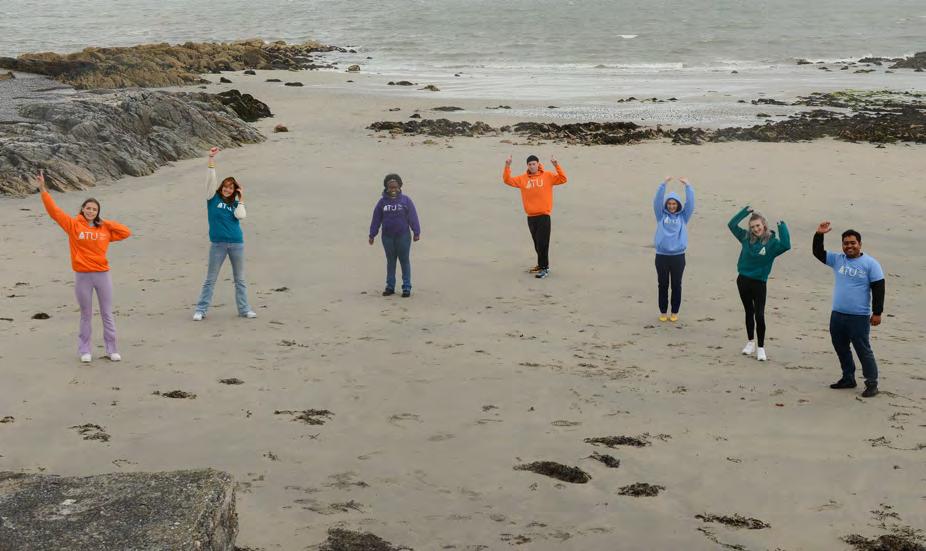


June 2022
We sign agreements with universities and third-level educational institutes in Canada and meet ATU Alunmi in Vancover. Our partnerships with educational institutes world-wide will increase
We signed agreements with universities and third-level educational institutes in Canada and met ATU Alunmi in Vancover. Our partnerships with educational institutes world-wide will increase educational and research opportunities for ATU staff and students.
ATLANTIC TECHNOLOGICAL UNIVERSITY MAGAZINE THE FUTURE IS HERE Issue Six March 2023 | 4
July 2022
August 2022
September 2022
We raised the Pride flag and attended Pride summer events in Galway, Mayo, Leitrim, Sligo and Donegal.
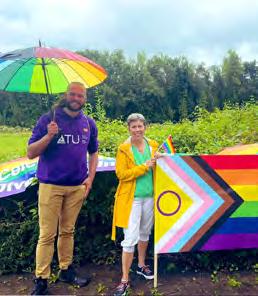
December 2022
ATU became the first technological university to have one of its campuses designated as Autism Friendly with ATU Sligo receiving this accolade. ATU Sligo joins DCU and NCI in being designated as Autism Friendly and are the first in the west of Ireland to achieve the award.

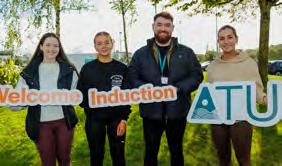
We held our first ATU Summer School. Over 40 undergraduate students, travelled from Sweden, The Netherlands, Switzerland and Germany to attend our Sustainable Futures Summer University Course.
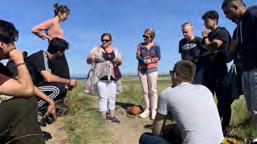
January 2023
Our new ATU Academic Council met for the first time. The meeting was hosted by ATU Mayo campus. The council comprises of academics, and professional, management and support staff from the three colleges: Galway-Mayo, Donegal and Sligo.
We welcomed over 4,000 new first-year students who started programmes across all our campuses in Donegal, Galway, Mayo and Sligo. Students from around Ireland were joined by many international students.
We also became members of the EU GREEN European University Alliance.
We held our first research symposium in Modelling and Computation for Heath and Society (MOCHAS). MOCHAS will produce high-level, multidisciplinary research graduates who can develop, communicate, and exploit modelling tools for the solution of real-world problems relevant to societal needs. The MOCHAS projects researchers are collaborating with 9 public enterprises, 11 private enterprises, and 14 national and international research partners.

ATLANTIC TECHNOLOGICAL UNIVERSITY MAGAZINE THE FUTURE IS HERE 5 | Issue Six March 2023
October 2022
November 2022
We hosted a conference which explored the economic and social potential of the north-west region in terms of education and employment. The conference was organised by the North West Tertiary Education Cluster (NWTEC) comprising of ATU, Donegal Education & Training Board (DETB), Ulster University (UU) and North West Regional College (NWRC).
Over 5,000 students graduated from ATU with 1,390 in Donegal, 1,780 in Sligo, and 1,850 in Galway and Mayo. They were the first graduates to be conferred with ATU awards.

21 ceremonies took place across five locations in the west and north-west.

February 2023
ATU hosted the global event, “Invent for the Planet 2023”. Students from six universities and 20 countries looked at developing sustainable solutions to hard problems. In their pitches students addressed environmental, sustainability, and social issues.

St. Angela’s College Sligo and ATU officially lodged a joint submission to the Minister for Further and Higher Education, Research, Innovation and Skills for the integration of St. Angela’s College into ATU.


March 2023
ATU Sport hosted the Yoplait LGFA HEC Championships 2023 at the Connaught GAA Centre of Excellence in Mayo.

ATLANTIC TECHNOLOGICAL UNIVERSITY MAGAZINE THE FUTURE IS HERE Issue Six March 2023 | 6
Our President Reflects on our First Year
The newly established Atlantic Technological University was launched on 1 April last year, after more than a decade of negotiations, consultations, and planning. A few days later Minister for Further and Higher Education, Research, Innovation and Science Simon Harris unveiled our new brand of ATU under the banner “The future is here”.

This was followed by a week of activities at each of our eight campuses, from Galway to Donegal. It was also the start of my journey as President of ATU, participating in many events on each campus over the following months. The total distance I traveled over that time was nearly 20,000km, highlighting the scale of our region.
ATU covers a region the size of Wales and traveling the sometimes winding roads in the west and north-west highlights the need for investment in transport infrastructure in this region. This scenic journey could also be seen as a metaphor for our progress as a fledgling university, marking each milestone we pass.
ATLANTIC TECHNOLOGICAL UNIVERSITY MAGAZINE
7 | Issue Six March 2023
At our next milestone, we look forward to welcoming our 9th campus to ATU this summer, when St. Angela’s College will join our university community.
From the outset we aimed to become a TU of scale, quality, and impact, with a greater capacity for collaboration with regional, national and international partners. In just our first year, we have made great strides towards achieving these aims. Our recruitment of CAO students increased in 2022, and further student number increases are predicted for this September.
It has been a year of firsts: our first recruitment and induction of students as one university, and our first ATU conferring ceremonies, which saw over 5,000 new graduates receiving awards across 21 ceremonies in Donegal, Galway, Mayo and Sligo. Many of our towns became university towns for the first time, bringing
opportunities for education, investment and employment.
ATU’s focus on innovation, entrepreneurship, and community engagement is already having a direct impact on the region. The university’s research activities are helping to address some of the region’s most pressing challenges, such as climate change and sustainable development. Our ethos of inclusion and diversity contributes to meaningful outreach and community initiatives.
We are in a unique and privileged geographical position in the most western point of Europe. This year, we also became one of nine European universities participating in the EU GREEN European University Alliance. This alliance will bring together students, staff and researchers across the EU, delivering social and economic benefits to peripheral regions
through an educational environment committed to sustainability.
While we continue to embed ourselves in Europe, we are also establishing new ties across the Atlantic, developing partnerships with universities in the United States and Canada. We are forging deeper connections with our Northern Ireland neighbours, building on existing cross-border relationships.
As a new technological university, we continue to support pathways into ATU from the further education sector, and this work will become a bigger part of our activities into the future.
The last year has been a journey of discovery and adventure with some challenges along the way. I hope you will continue with us on that journey in the formative years ahead, through your continued support, partnership and engagement.
THE FUTURE IS HERE
Issue Six March 2023 | 8
The last year has been a journey of discovery and adventure with some challenges along the way. I hope you will continue with us on that journey in the formative years ahead, through your continued support, partnership and engagement.”
University Updates ATU Strategic Plan
ATU recently formed an ATU Strategic Planning Council which will advise on the development of our new strategic plan and comprises of representatives from the Governing Body, students, staff, unions and external stakeholders. It meets every four to six weeks.
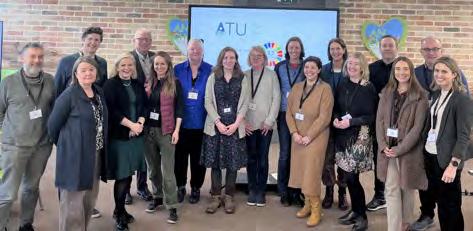
with staff
During January, internal consultation on ATU’s strategy commenced. The first event was a week long series of workshops called “17 Rooms” where staff came together to discuss the global challenges presented to us by the Sustainable Development Goals for the planet.
The aim of the workshops held in the South Sligo Community Enterprise Hub was to bring people together from all campuses with
shared interests, to speak about current work in ATU under each of the 17 sustainable development goals and to formulate achievable actions to feed into the strategic plan process.
In addition, there was a series of meetings on each ATU campus with the President of ATU, seeking views of colleagues on a variety of topics included teasing out the idea of “One ATU”, how ATU can best serve the region and an introductory
discussion on the values of the university.
There was a further round of campus meetings in March and other channels for consultation have also commenced.
Consultations with our external stakeholders will commence shortly and we hope to launch our next strategic plan in October of this year.
ATLANTIC TECHNOLOGICAL UNIVERSITY MAGAZINE THE FUTURE IS HERE 9 | Issue Six March 2023
We have had a good thoughtful start to the strategic planning process. The range of ideas from the January sessions show that people have really engaged and are looking forward to the development of ATU. ”
Dr Des Foley, Strategic Plan Co-ordinator
Consultations
ATU colleagues pictured at one of our strategic plan consultation workshops.
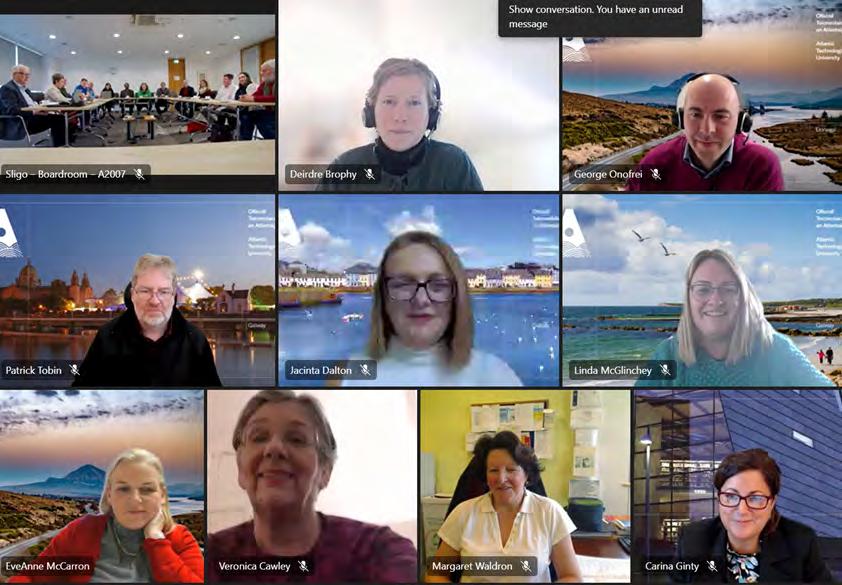
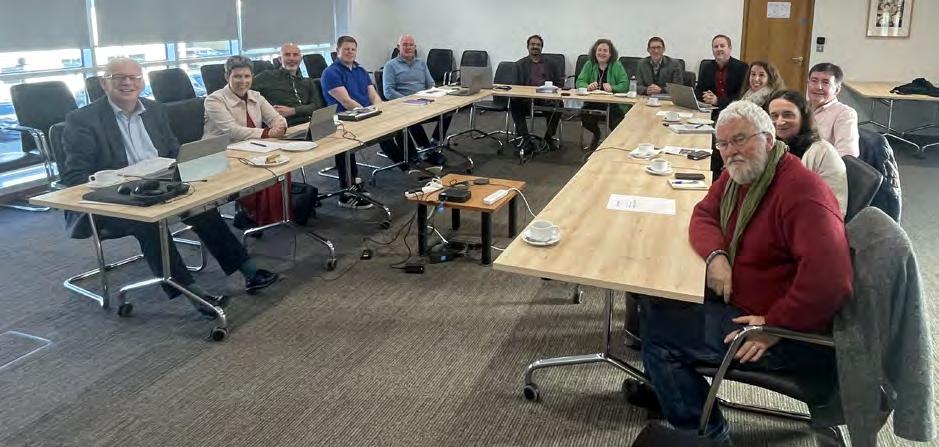
ATLANTIC TECHNOLOGICAL UNIVERSITY MAGAZINE THE FUTURE IS HERE Issue Six March 2023 | 10
First meeting of the ATU Strategic Planning Council, online and in-person.
Meet our new Alumni Officer, Lauren Reynolds
Hello! My name is Lauren Reynolds and I have recently been appointed Alumni Officer for ATU.
Before this, I worked as Schools Engagement Officer in ATU Donegal, a role which I enjoyed immensely. In some sense, I’ve topped and tailed a part of the student lifecycle; welcoming new students at the beginning of their student journey in my role as Schools Engagement Officer, and now as Alumni Officer, working to keep students engaged after they’ve finished their studies in ATU.
Prior to joining ATU, I worked across marketing and communications in a range of sectors, both private and public, for nearly 15 years working across national and international markets.
What is an Alumnus?
Like many things, we all have different ideas of what an Alumnus might be. The Oxford Dictionary defines an Alumnus as:
• A graduate or former student of a particular school, college, or university.
• A former member of a group, company, or organisation.
Whether a student graduated or not, studied somewhere at one time, be it at a university, college, or any higher education institute then they are an Alumnus of that institution.
Here at ATU we have broadened the definition and for us an Alumnus includes not just a past-student but also an ATU staff member, past and present, and any person who has an affiliation with the university.
What does it mean to be part of ATU’s Alumni Network?
Higher education is much more than the qualification a student receives on graduating. The time spent studying are formative years in a person’s life, from the lessons you learn inside and outside the classroom, to the people you meet and the relationships you build among classmates, lecturers, and support staff.
So why would you want to leave all that behind when you graduate? The journey has only just begun at graduation. And an Alumni network can play a pivotal role throughout the course of your life.

ATLANTIC TECHNOLOGICAL UNIVERSITY MAGAZINE THE FUTURE IS HERE 11 | Issue Six March 2023
I look forward to working with ATU colleagues, students, past-students and external stakeholders to build a local and global Alumni network for ATU. ”
An Alumni network also gives its members an opportunity to give back to the institution if they want to, by way of offering support in many different forms such as guest lecturing, mentoring, or creating inroads for job opportunities, placements and much more.
As ATU’s new Alumni Officer what are your priorities for the next year?
As we approach the first year as a university the time is ripe to bring together students and staff, past and present, as well as those people and organisations affiliated with ATU to be part of a globally connected ATU Alumni network.
The priorities for the year ahead are:
• Connecting: We will establish a database of Alumni and commence membership of an ATU Alumni network.
• Communicating: We will build relationships with ATU Alumni through thoughtful communication and content.
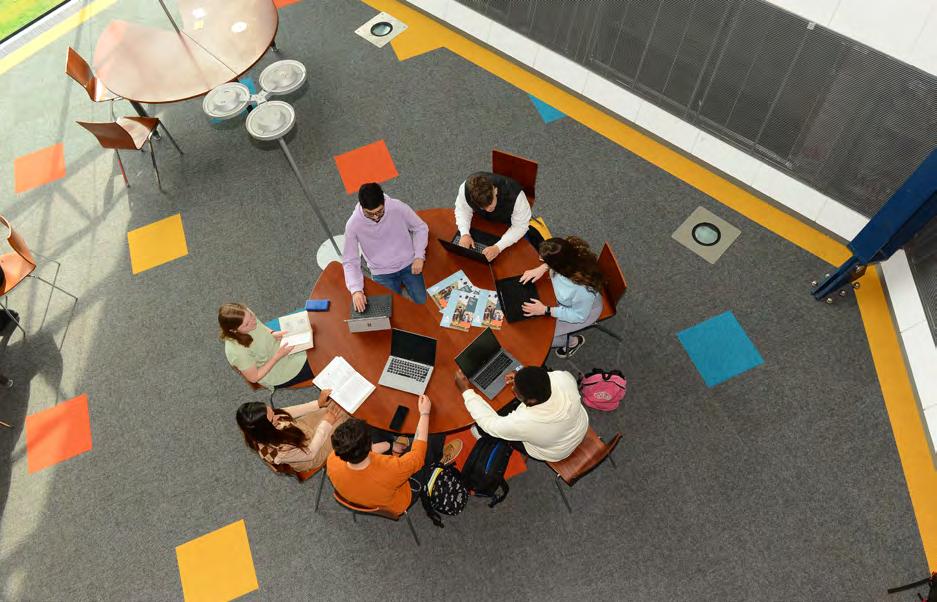
• Engaging: We will develop a roadmap for continued support for Alumni in their professional and personal development.
• Contributing: We will strengthen Alumni connections with ATU by way of generating opportunities for Alumni involvement with the university.
If you would like to get in touch with any Alumni news, connections, or ideas, please click here.
ATLANTIC TECHNOLOGICAL UNIVERSITY MAGAZINE THE FUTURE IS HERE Issue Six March 2023 | 12
Alumni networks offer their members a ready-made support network. A network full of people with shared experiences to connect with and continue to learn from and support each other. ”
Research Round Up
Women in Academia and Research
ATU lecturer and researcher Jess Mannion talks to us about widening participation in higher education.
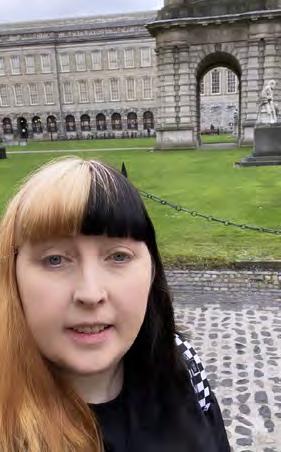
Tell us about your journey into academia and research.
I was once a school dropout at age 15, but later as a Youthreach student I sat some leaving certificate subjects, but never completed the full qualification. I often think about going back to get that qualification. Maybe after my PhD! My earlier negative experiences of education were most probably attributed to my undiagnosed ADHD, as well as the life challenges that come with growing up in a working-class family.
What does “widening participation in higher education” mean to you?
Widening participation in education means working to increase the number of young people from underrepresented groups, such as working class, disabled and ethnic minorities, into academia.
A common phrase used when talking about experiences of academia is ‘imposter syndrome’. Imposter syndrome is when an individual doubts their ability, skills, and accomplishments. If an individual hasn’t had similar opportunities and experiences as their peers, they can easily doubt themselves.
I have worn the imposter crown, where I have doubted my ability, but I have also straightened that crown and owned that I am different. I realise that I am someone who can
be a role model for working class and neurodivergent students.
“As a disabled disability researcher, lecturer, writer, and advocate, I cannot conceal my identity in shame, I need to be proud and authentic.”
Why is it important to promote the widening of participation in higher education?
It’s important because we need to challenge some of the internalised self-perspectives of underrepresented groups and also of some educators who may not hold high expectations of the student from a council estate sitting across from them in the lecture theatre.
Often people like us, believe we don’t deserve to be in the classroom, and we lack self-belief in our abilities. But all it may take is just one person to believe in us and we will shine. We are often not vocal about our struggles because we do not want to stand out more. However, more of an understanding of how hard it often is for us compared to the average affluent student, can really help.
Tell us about the work you do to help widen participation in higher education.
I have participated in many Youthreach events, where I gave talks on my experiences of returning to education and the positive impact this has had on my life. The
About Jess Mannion
Jess has worked at ATU Sligo, as a Social Sciences lecturer for the past fourteen years. She is also a PhD candidate and casual lecturer in Trinity College Dublin. Education plays a huge part in her life. She says that she’s addicted to studying courses, with eight higher education qualifications under her belt. She also writes for publication and works as a peer reviewer for two international academic journals.
ATLANTIC TECHNOLOGICAL UNIVERSITY MAGAZINE THE FUTURE IS HERE
13 | Issue Six March 2023
Youthreach programme provides two years integrated education, training and work experience for unemployed early school leavers without any qualifications or vocational training who are between 15 and 20 years of age. To reach an even wider audience I also write articles and contribute to several publications.
What has been the most defining moment in your career to date?
A Youthreach graduate turned higher education student once approached me and explained that he had never considered higher education as an option prior to attending one of my Youthreach speeches. Listening to me talk he realised if I could do it, he could too. Prior to this, I often worried that my honesty about my background would attract negative judgement. But now I realise if I help just one person access education, which will most probably positively impact their life, then it’s worth any negative judgment I may receive.
Tell us about the book
‘ResearcHER: The power and potential of research careers for women’
‘ResearcHER: The power and potential of research careers for women’ is a book authored by Women in Academia Support Network (WIASN). I contributed a chapter to the book and am proud to have been included.
WIASN is a trans-inclusive, intersectional network for women in academia. Each chapter was written by a diverse scholar from various countries, who gave their insight into the career of a real-life researcher, their background and journey into research. This book is aimed at post-

primary school girls with the aim of widening participation in academia.
What was the purpose of the book?
We want to destroy stereotypes and show that not all researchers look the same. Researchers can include women from diverse geographies, women who are disabled and woman who are part of the LGBTQ+ community. WIASN gained funding to donate these books to 1,000 disadvantaged schools worldwide. The proceeds of books bought will help our aim of donating more books worldwide. We’re aiming for one million reads. I hope that this initiative will challenge any negative selfperspectives from underrepresented groups.
Where do you go from here?
My next aim is to challenge some of the perspectives of those who support and teach students in post-primary and higher education. There is a lot more that we can do to understand and support our nontraditional diverse students. Examples of this include showing empathy, getting to know students and realising their potential, providing studentcentred learning, allowing for flexibility in provision, reducing barriers to participation, avoiding restrictive and inflexible policies, and advocating for and creating accessible learning environments by addressing inequalities.
“Widening participation means much more than getting students into university. We need to keep them here and support them to leave with their regalia, mortarboard, and parchment, as they walk confidently towards their new career.”
Further Reading
Sheerin, F. and Mannion, J. (2021) Valuing diversity in our communities. Journal of Intellectual Disabilities, 25(3), 293–295.
In this article Jess talks about stigma and the possible impact of her honesty on her career.
Please click here to read. Women in Academia Support Network (WIASN) (2022) ResearcHER:
The power and potential of research careers for women. Emerald Publishing: Bingley.
Please click here to buy.
ATLANTIC TECHNOLOGICAL UNIVERSITY MAGAZINE THE FUTURE IS HERE Issue Six March 2023 | 14
Biodiversity and the Humble Horse Mussel
Dr José María Fariñas-Franco, ATU lecturer in Aquatic Biology talks to us about his research and the importance of the horse mussel in creating coastal ecosystems.
What is the focus of your research work?
I research the role of marine keystone species, organisms without which whole ecosystems would collapse, especially those that form habitats of high biodiversity, like shellfish reefs (horse mussels and native oysters), seaweed beds and seagrass meadows. I also have a strong interest in establishing how seaweed and shellfish aquaculture can help restore marine ecosystems to a healthy state.
You were recently involved in a study of the biodiversity of a model subtidal habitat, formed by the horse mussel. Tell us about the project.
For the project we chose three reef forming species; horse mussels, blue mussels, and a worm (yes, a worm): the tube building, sand mason (or Ross) worm.
The reefs these organisms can form are often described as biodiversity hotspots. Those formed by shellfish such as horse mussels and oysters are thought to be some of the richest habitats on Earth.
However, they are especially sensitive to destruction caused by bottom fishing. So, it’s important to describe their condition, extent, and document
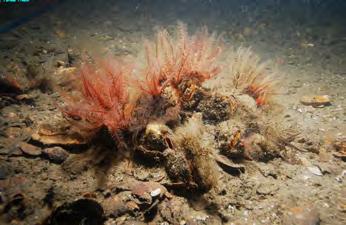
biodiversity baselines in the different locations where they occur.
Recording condition baselines is necessary to implement site-specific protective measures. This project examined both the density of these reef forming organisms and described the biodiversity associated with them across their distribution ranges in the northern European seas, investigating their responses to fishing and other impacts.
What was the aim of the study?
The main aim was to fully document the biodiversity associated with horse mussel reefs in as many locations as possible in the Northern Atlantic Ocean.
Horse musses, are large (up to 20 cm) mollusc bivalves, post glacial relicts found in cold waters in the Northern Atlantic and Pacific Oceans. In Ireland they can be found in Strangford, Belfast and Carlinford Loughs, the Ards Peninsula, and the Codling and Arklow Banks in the Irish Sea.
In my research I found horse mussels grow very slowly (5 cm in six years) and live a long time, some for more than 60 years. Horse mussels are important because they create reefs and attract high numbers of marine invertebrates that seek food
and shelter.
How did you carry out your research?
We examined historical biodiversity data collected by SCUBA divers going as far back as the early 1990s and collected new data during underwater surveys in Orkney, Wales, the Isle of Man, Northern Ireland and Norway. We conducted the surveys using SCUBA diving equipment, in depths of up to 45 m, in water temperatures ranging from 4 to 15 degrees Celsius.
In each site divers collected clumps of horse mussels and brought them to the research vessel, where the animals were removed from the samples, preserved and later identified and counted in the laboratory to determine the reefs’ biodiversity. We used statistical analysis to compare the biodiversity at the different sites and establish if fishing had negative effects on their biodiversity.
What did your findings reveal?
The study confirmed biodiversity in horse mussel reefs is high, with up to 300 different species of seaweed and animals associated with each clump of mussels sampled.
ATLANTIC TECHNOLOGICAL UNIVERSITY MAGAZINE THE FUTURE IS HERE 15 | Issue Six March 2023
Cumulatively we found more than 800 distinct types of macroinvertebrates (small animals including worms, shrimp, and clams) and over 40 different species of seaweed living in horse mussel reefs.
The horse mussel reefs we have in the Northern Atlantic, are naturally rich but environmental conditions make some reefs richer compared to others. For example, species richness declined with depth and with faster currents which remove the softer sediments where burrowing organisms live, leaving a more species-poor, coarser substrate.
The study also found the combination of horse mussels and kelp have a cumulative positive effect in biodiversity, attracting a richer and more varied community of organisms compared to reefs formed just by horse mussels.
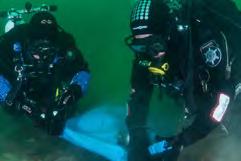
Why should we protect and restore shellfish like the horse mussel?
Shellfish like native oysters and mussels are not just food or a resource. They are species that support whole marine ecosystems and create rich habitats. Their damage or disappearance can lead to what we call ‘cascading
ecological effects,’ that is continuous degradation beyond a point of noreturn.
In Ireland for example we had extensive oyster beds around all our coasts. These beds have now almost completely disappeared due to overfishing and, to a lesser extent, disease. The only remaining ones are in isolated areas in the west and south-west coasts.
The destruction and decline in shellfish habitats worldwide, due to over exploitation and other impacts, is not only problematic from a purely ecological point of view (habitats and biodiversity should be preserved for their intrinsic value) but also because it affects us directly. A reduction in biodiversity means less fish and shellfish on our tables.
The disappearance of shellfish habitats can also lead to increased erosion and floods, as the reefs absorb wave energy protecting our shorelines. By protecting them we are also protecting our quality of life.
Further Reading
To find out more about Dr José María Fariñas-Franco, please click here and to read more on horsel mussel biodiversity click here
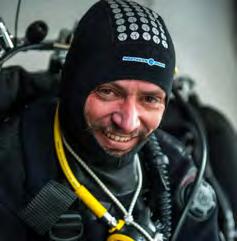
About Dr José María FariñasFranco
Dr José María FariñasFranco is a marine scientist studying coastal ecosystems, how they function, their biodiversity and their responses to human impacts. Originally from Spain, he moved to Ireland 22 years ago. He has conducted survey work world-wide including on Irish and British coasts, the Caribbean and the Pacific coast of Canada and Malaysia.
He has published more than 100 scientific reports and over 20 peer reviewed scientific papers in international journals. He combines his role as a lecturer in ATU with his research interests in conservation and restoration ecology.
ATLANTIC TECHNOLOGICAL UNIVERSITY MAGAZINE THE FUTURE IS HERE Issue Six March 2023 | 16
“ As a diver and enthusiast of our wild Atlantic coasts, I believe maintaining the integrity of our oceans is crucial, not just for their intrinsic value and worth, but because our future as a society depends on them.”
ATU and the World Technology Universities Network (WTUN)
Board of WTUN.
The World Technology Universities Network is a network of global technology universities committed to undertaking cutting-edge, challenge-led research with direct benefits to people and society. The network is also committed to providing education for the next generation of global citizens. Members are spread across the globe including Europe, the Americas, Asia, Africa, the Middle East and Oceania, allowing members to gain global insights into the challenges that face economies, societies and the environment.
“Membership of WTUN is of huge benefit to ATU. Universities worldwide face similar challenges, and this network provides a vehicle for ATU to learn from our peers in other universities and to share our knowledge with them. Through our active engagement on both the general and operation boards of WTUN we are building relationships with several international universities.”
Dr Ciarán Ó hAnnracháin, ATU’s representative on the Operational Board of WTUN.
WTUN’s Objectives
• Promote better understanding of the role and characteristics of technology universities across the world.
• Promote mobility and global citizenship opportunities.
• Collaborate on research and knowledge transfer to address global challenges.
• Develop position and policy statements.
• Facilitate links between world technology universities and industry, NGOs and SMEs.
• Share best practice and provide opportunities for capacitybuilding among member universities.
To find out more about WTUN please click here
Annual Congress
WTUN’s annual congress brings together universities from across the globe. The annual event helps facilitate original research and collaborations to show how we can all benefit from new technology.
Since 2016, members have met at these annual congresses where they exchange knowledge and build better networks. The 2022 Congress was hosted by Suranaree
University of Technology in Nakhon Ratchasima, Thailand. The 2023 Congress will be hosted closer to home by Technische Universität Ilmenau in Erfurt, Germany. To find out more about WTUN’s congresses please click here
WTUN also have an open call to academics who may wish to open webinars or conferences to staff or students of partner institutions.
ATLANTIC TECHNOLOGICAL UNIVERSITY MAGAZINE 17 | Issue Six March 2023 THE FUTURE IS HERE
The World Technology Universities Network (WTUN) provides ATU with a unique opportunity to connect with universities worldwide. Dr Orla Flynn represents ATU on the General Board of WTUN and Dr Ciarán Ó hAnnracháin represents ATU on the Operational
ATU students shortlisted for the Brian Cantor Scholarship Prize
In 2023, WTUN launched the WTUN Brian Cantor Scholarship Prize in honour of the founding Chair of WTUN and former Vice Chancellor of the University of Bradford, Professor Brian Cantor.
The prize is open to postgraduate students in any discipline at any of the WTUN’s member institutions who can demonstrate that they are undertaking a PhD that aligns with at least one of the two statements in the WTUN vision
ATU has shortlisted two PhD students for the competition, Agni Paul, ATU Donegal (Dr James Connolly, supervisor) and Nanshin Nansak, ATU Sligo (Marion McAfee, supervisor). To find out more about the scholarship prize please click here.

Staff exchanges
WTUN recently opened the call for staff exchanges to facilitate collaboration between member institutions. There are 18 grants available of £2000 each for staff (academic and professional services) and PhD students to visit another member institution.

Exchanges are open to new projects, initiatives and teaching and learning opportunities as well as those that were involved in previous rounds and wish to use the funds to continue their work.
WTUN welcomes exchange proposals on topics such as innovation and entrepreneurship, gender equity, and climate action. To find out more about staff exchanges please click here.
Student Competitions
WTUN also runs two competitions annually for undergraduate students. The first is the Innovative Technology and Global Citizenship
for the 21st Century Competition. It requires students to form multidisciplinary teams to address one or more of the United Nation’s Sustainable Development Goals. The second competition is the WTUN Hackathon which is a 48hour sprint event where students are given the chance to address an issue around climate action. To find out more about these competitions please click here.
Should you wish to find out more information on the activities outlined in this article, please feel free to contact Dr Ó hAnnracháin on ciaran.ohannrachain@atu.ie
ATLANTIC TECHNOLOGICAL UNIVERSITY MAGAZINE THE FUTURE IS HERE
Issue Six March 2023 | 18
Sustainability News
From Administrator at ATU to Swift Whisperer
Retired ATU administrator Lynda Huxley talks to us about the Swift and the ATU Swift Nest Box Project
Tell us about the Swift.
Swifts are extraordinary birds. They are the fastest bird in Ireland’s skies and can reach speeds of around 200 km per hour. They are often confused for Swallows or House and Sand Martins. The Swift’s sickle-shaped wings and dark underparts distinguish it in flight from Swallows and Martins.
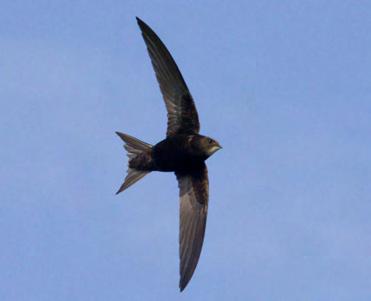

“Swifts only land to breed. No bird spends more of its life in the air than the Swift. They feed, drink, sleep, collect their nest material, and even mate on the wing. In a Swift’s lifetime it will fly around 2 million miles which is the equivalent of more than four trips to the moon and back. At dusk they will climb to around 3,000 metres and shut down half of their brain so that it can rest whilst the other half remains awake and keeps then airborne.”
The Swifts come to Ireland each year from mid-April to early September to breed, lay their eggs and rear their young. They spend our winter months in Southern Africa. They go to Southern Africa because the insect food is prolific there from October to March.
What do they eat?
They feed on air borne insects, one of their favourites is the midge. They collect the food whilst flying and funnel the insects into their wide-open mouth with the help of stiff bristles that surround the gape. When the Swifts are here in summer, each pair will consume over half a million insects so a healthy environment free of pesticides is essential to provide enough airborne insects for their food and for their survival. Please click here to watch chicks feeding.
How do they breed?
Swifts only land for the breeding process. They reach breeding age when they are around three years old. Until then they fly 24 hours a day, seven days a week. The birds that are of breeding age and have a partner and will spend each night of the breeding season in the nest site.
Where do they nest?
These days, Swifts nest almost exclusively in old buildings in our towns, villages and cities. Before this, they would nest in holes in trees or in cliff faces. There are still some Swifts nesting in cliffs in Co. Antrim and Co. Sligo.
Why have we seen a big decline in the Swift population?
Ireland has seen a dramatic decline of close to 50% of its breeding population in the past 40 years and this is mostly due to loss of their ‘traditional’ nest sites in old buildings in our urban areas. Nest sites are often lost when buildings are renovated or demolished. Swifts are 100% faithful to their nest site and their partner. If they lose their home, it can take several years for them to find a new home and during that intervening period they will not breed.
ATLANTIC TECHNOLOGICAL UNIVERSITY MAGAZINE 19 | Issue Six March 2023
Photo: Micheál Casey
“Surveys carried out in Mayo in 2022 showed a 28% increase in Swifts due to provision of artificial nest boxes both externally mounted and built-into new public buildings.”
Why should we protect Swifts?
• They are an important part of our urban biodiversity – built and natural heritage. Over 90% of nest sites are found in our villages, towns and cities.
• Ireland is their home – they only breed when they are here and not when they are in Southern Africa.
• A fossil found in Germany shows that they have been around for 49 million years. We should not let them become extinct when we have it in our power to protect them.
• There is no legal protection for the nest sites outside of the breeding season.
ATU Graduate Jaroslaw
Majkusiak (Jarek) carried out research on the Swifts for his Masters. What were his key findings?
The title of Jarek’s thesis is “Breeding Biology of the Common Swift (Apus apus) in Ireland – the most north-westerly edge of the nesting habitat”. Jarek analysed thousands of hours of video footage that were recorded at ATU Mayo nest boxes.
He created data sets so that he could see how many feeds each chick received from hatching to fledging. He found that the Swift parents go out to collect food for their young early in the morning between 5-6 am. They return to
What can we do to protect the Swift?
We can give them secure, longterm nesting sites and ensure our environment remains healthy by not using pesticides that kill their insect food.
Tell us about the Swift nest box project at ATU Mayo.
The first public Swift nest box project in Ireland was set up at ATU (then GMIT) Mayo campus in 2012 as part of its Green Campus Biodiversity Themed Projects. There were originally 12 nesting compartments, expanded to 18 in 2019, each equipped with an infra-red analogue camera. This
enables 24/7 live-streaming during the breeding season via the ATU website. Click here to watch Swifts banging off ‘traditional’ nest sites at ATU Mayo campus.
Has the nest box project at ATU Mayo had an impact on the Swift population?
In 2022, the ATU Mayo campus nest box project was home to 12 pairs of breeding Swifts. In addition to the external nest boxes at the Mayo campus, there are also 23 built-in nest boxes at the ATU wing of the new Castlebar Leisure Centre. In 2022 we noted that 18 of these built-in nest boxes were occupied by Swifts making the ATU combined nest boxes projects the most successful in Ireland.
the nest and feed breakfast to the chicks and then the whole family goes back to sleep. The day’s main feeding starts in earnest at 9 am.
He also compared feeding frequency with rainfall, wind and temperature throughout the breeding season. Jarek’s research shows that Swifts do very well here. The chicks fledge at around 42 days old which is comparable to countries in mainland Europe.
Jarek also observed that on a day of good weather, the parents would bring a bolus of insects to the chicks every 40 minutes. Whilst on a day of bad weather, the chicks would have to go without food for 24 hours or more. However, the Swift has an adaptive physiology which means that in times of bad weather when food is scarce it can enter a state of
torpor. In this state it uses very little energy. Adult and chicks can survive several days in this state.
Further Information
You can find out more about Jarek’s research project on the Swift Conservation Ireland Youtube Channel by clicking on the links below:
‘Day and Night with the Swifts’ 2020
Mayo Changemaker’s Conference video 2022
Click here to watch a video on the Swifts of Mayo and click here to visit the Swift Conservation website.
You can watch a recording of Lynda’s recent talk by clicking here
THE FUTURE IS HERE Issue Six March 2023 | 20
Lynda Huxley worked at ATU Mayo campus for to 20 years, retiring in November 2021. She was involved with the Green Campus and through this was instrumental in setting up the campus Swift Nest Box Project in 2012 and continues to be involved with this project.
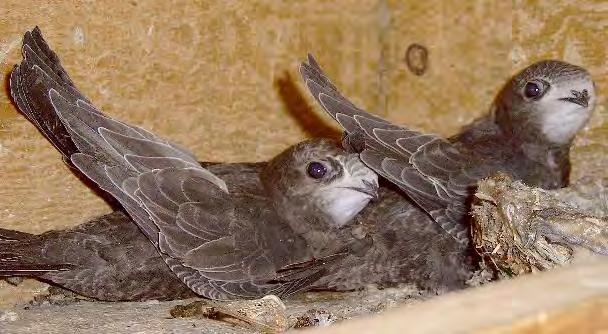
In March 2021 she received the ATU President’s Special Award for Outstanding Institutional Citizenship.
Lynda leads the volunteer organisation, Swift Conservation Ireland, and is now recognised as a national expert on Swift conservation. She has presented papers at several International Swift Conferences (UK, Poland, Israel and Spain).
To listen to an interview with Lynda on the Swift, please click here

ATLANTIC TECHNOLOGICAL UNIVERSITY MAGAZINE 21 | Issue Six March 2023
Lynda Huxley
Pictured left to right: Lynda Huxley, Jarek Majkusiak and Chris Huxley.
ATU joins Alliance to create European “Super Campus” across 9 EU Countries
ATU recently took part in the launch of EU GREEN which was held in Cáceres, Spain. EU GREEN is a European University alliance that aims to become a gateway to sustainability, growth, inclusive education and the environment.

ATU will join universities from Spain, France, Italy, Poland, Romania, Sweden, Germany and Portugal to form a ‘super campus’ with more than 158,000 students and 18,000 staff. The nine universities will participate in the multi-million-euro programme, which aims to strengthen strategic alliances between universities in the European Union (EU) and increase international competitiveness within the European Higher Education Area.
EU GREEN has been selected by the European Commission as one of only four new European University alliances across Europe to be commenced in 2023 and to receive funding of more than 14 million euros over four years. The rectors of the nine universities travelled to Cáceres, where they were joined by ten rectors of Ukrainian universities, who were invited as part of a cooperation project funded by the Polish Government through the Wroclaw University of Environmental and Life Science, to symbolize that universities are key to educate in human rights, peace and solidarity. Please click here to find out more about EU GREEN.
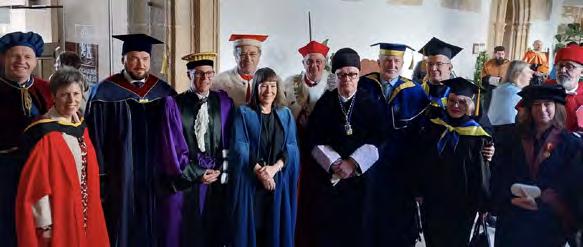
THE FUTURE IS HERE Issue Six March 2023 | 22
ATU is delighted to be part of this ambitious European University alliance which will change the landscape of third-level education for universities based in peripheral regions of Europe and which will also open opportunities for students to study common degrees across multiple universities in nine countries. EU GREEN will allow students, staff and researchers to work together across the EU. It will also bring social and economic benefits to the region through an educational environment committed to sustainability.”
Dr Orla Flynn, ATU President
ATU President, Dr Orla Flynn pictured with colleagues from participating EU universities at the EU Green launch.
Invent for the Planet Winners
Winning team’s design draws on hydropower and wind power to generate electricity stored in a battery.
A student team called “Power Up” recently won the Irish leg of the 2023 international “Invent for the Planet” competition. They developed a design for an affordable energy generator system using hydropower and wind power to generate electricity stored in a battery. The competition was held on the ATU Galway City campus on 8-10 February.
The winning team comprised of Xing Ying Chuang, third year Biomedical student at ATU GalwayMayo; Tom Hakizinka Senga, second year Mechanical Engineering student at Dundalk IT; Tenis Ranjan, postgraduate student at University of Galway; Edbin Ostilio Buezo Zuniga, first year engineering student at ATU Sligo; and Ontiretse Ishmael, PhD computing, ATU. They described their prototype “Own It” as an affordable clean energy generator system which uses hydropower and wind power to generate electricity stored in a battery.
“Based on our calculation, the power generated by our prototype (“Own It”) can light up approximately 250 light bulbs in one hour. We should all be using clean energy to keep our planet intact.”
Winning Team, “Power Up”
The runner up “Eat Smart” team comprised of Caoimhe McCormack, first year Environmental Science student at ATU Sligo; Zain Ali, IT Master student at ATU Donegal; Vijay Kumar, IT Master student at ATU Donegal; and Jessica Henry, third year Software Engineering at ATU Sligo.
“Innovation is the key to solving our world’s most critical issues and at “Eat Smart,” we believe in using our creativity and drive to benefit the planet. We are proud to have received recognition for our solution to prevent food waste and we will continue to work towards a more sustainable future.”
Runner-up Team, “Eat Smart”
Another Irish team “Blue Carbon” designed a solution to remove existing carbon from the environment. The team used the space beneath wind turbines for aquaculture, such as mollusc and seaweed farming, to remove carbon, and stimulate fish stocks through the creation of artificial reefs.
Eight different teams worked intensively on a selection of challenges with guidance from mentors. They had to present a prototype, a ten minute pitching presentation and 90 second video
to a panel of judges.
Organiser Dr Jack Saad, Fulbright Faculty Scholar, Texas A&M, and lecturer in Robotics at ATU Galway-Mayo, said: “Over the 48 hours, it was great to see students from different backgrounds and experience coalesce to form a talented team to develop a practical solution to some of the planet’s greatest challenges.”
“The event will leave an indelible mark on the participating students’ learning experience and will help give them the experience and confidence needed to overcome life’s challenges.”
Organiser Dr Jack Saad, Fulbright Faculty Scholar, Texas A&M, and lecturer in Robotics at ATU Galway-Mayo
ATLANTIC TECHNOLOGICAL UNIVERSITY MAGAZINE 23 | Issue Six March 2023
About the Invent for the Planet Competition
The competition is a 48-hour intensive design experience (IDE) that engages students at different universities around the world on a single weekend to solve highimpact, global problems.


Organised by Texas A&M University, it ran synchronously in 29 universities across 22 worldwide locations.
ATU School of Engineering hosted the Irish leg of the competition for the second year in a row.
35 students competed from ATU, University of Limerick, University of Galway, Munster Technological University, Technological University of Shannon and Dundalk Institute of Technology.
The Irish leg of the “Invent for the Planet 2023” was kindly sponsored by Thermo King; Boston Scientific; Marine Institute, BIM; the Department of Agricultural, Food and Marine; and MathWorks.
THE FUTURE IS HERE Issue Six March 2023 | 24
Invent for the Planet winning team, “Power Up” pictured with the competition’s organising team and ATU staff.
Invent for the Planet runner-up team, “Eat Smart” pictured with the prize-winning cheque.
ATU Lecturers Travel from Donegal to Wicklow in Electric Vehicles (EVs)


Charles Young and Brendan Corry, ATU lecturers accompanied by lecturers from North-West Regional College, Donegal ETB and South West College participated in the Electrified Grand Tour Focus in January of this year.
They travelled in Electric Vehicles (EVs) from the north-west to Wicklow to conduct real-world testing of electric vehicles from differing manufacturers on Irish soil and learn how state-of-the-art EV Technology is being repurposed. They also saw how old EVs are given a second enhanced life (Range Therapy) and received the latest Hyundai EV Technical training and resources to enhance ATU courses.
ATU in collaboration with NorthWest Regional College recently launched a new Level 6 Certificate in Electric Vehicle Technology. This programme provides a pathway for learners to progress to ATU’s Level 7 programme in Electric Vehicle Technology.
The programme will allow graduates to work in an industry embarking on the rapid transition to EVs. This cross-border initiative, part of the north-west Tertiary Education Cluster provides opportunities for learners in the north-west region to gain knowledge in this rapidly changing industry and provide graduates with the necessary skills and knowledge to pursue careers in this area. To find out more about the programme please click here

ATLANTIC TECHNOLOGICAL UNIVERSITY MAGAZINE 25 | Issue Six March 2023
Equality, Diversity and Inclusion News
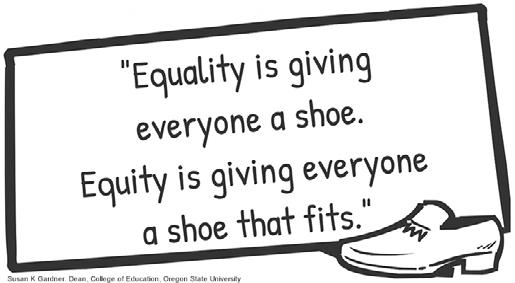
International Women’s Day at ATU
We celebrated our first International Women’s Day (IWD) as a university on 8 March. IWD is a global day celebrating the social, economic, cultural and political achievements of women. The day also marks a call to action for accelerating gender equality. The theme for IWD this year was ‘Embrace Equity’.
The aim of the IWD 2023 #EmbraceEquity campaign theme is to get the world talking about why equal opportunities aren’t enough. People start from different places, so true inclusion and belonging require equitable action.
“We are excited to hold a broad range of events to mark International Women’s Day where the achievements of women are celebrated and given the recognition they deserve. It is important to create a forum to discuss and celebrate women’s contribution to society in a positive and affirmative way.”
Professor Jacqueline McCormack, VP Equality, Diversity & Inclusion and Online Learning at ATU
ATU’s Equality, Diversion and inclusion (EDI) team organised several events to mark the day. The first of which was an ATU Photographic exhibition. This gave staff and students the opportunity to create a visible space for a woman who has inspired them.
Other events included a mono-printing workshop, an IWD lunchtime seminar, networking events for females in engineering and construction, and in Irish food and beverage. ATU libraries held a lunchtime talk on Aleen Cust, the first woman veterinary surgeon in the world.
International Women’s Day 2023 campaign theme: #EmbraceEquity. Click here for more information on the #EmbraceEquity Theme
THE FUTURE IS HERE Issue Six March 2023 | 26
Equity means creating an inclusive world. When we embrace equity, we embrace diversity, and we embrace inclusion.
We embrace equity to forge harmony and unity, and to help drive success for all. Equality is the goal, and equity is the means to get there. Through the process of equity, we can reach equality.”
International Women’s Day at ATU


On 9 March there was a live recording of a Fizz Buzz Podcast on Women in STEM. Fizz Buzz is an unfiltered, educational, and heart-warming series of podcasts from Mo Fiebiger and Stacy Wandrey’s sharing their experiences in tech. Mo and Stacey were joined by Diane O’Brien and Mary Loftus, Lecturers in Computing at ATU to discuss contemporary issues facing women in STEM. The episode will be aired on FizzBuzz platforms on 1 April.

In 2019, there were no female presidents of universities in Ireland. By 2022, there were six. In 2023 there are seven.
To mark this milestone and in the spirit of International Women’s Day, six of the university presidents met at Maynooth University on 6 March to participate in a panel discussion on leadership in modern universities. The panel comprised of Professor Eeva Leinonen, Maynooth University; Professor Veronica Campbell, South East Technological University; Professor Maggie Cusack, Munster Technological University; Provost, Dr Linda Doyle, Trinity College Dublin; Dr Orla Flynn, Atlantic Technological University and Professor Kerstin Mey, University of Limerick.
To watch a recording of the discussion please click here
Dr Orla Flynn, ATU President speaking at IWD 2023: In Conversation with the 1st six Female University Presidents
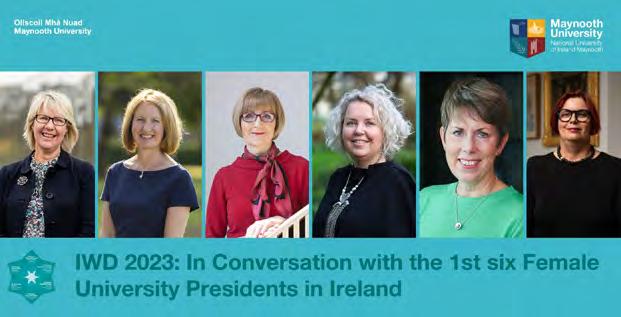
ATLANTIC TECHNOLOGICAL UNIVERSITY MAGAZINE 27 | Issue Six March 2023
There isn’t one path or one way. Work hard, give it your all! If an opportunity comes your way, take it. Push yourself, put yourself in positions where you’re a bit uncomfortable. Get used to being uncomfortable, challenged & pushed.
”
Participants at a mono-printing workshop held at ATU Mayo to celebrate IWD.
ATU Art and Architecture students celebrated IWD by handing out flowers, hearts, and notes at ATU Sligo
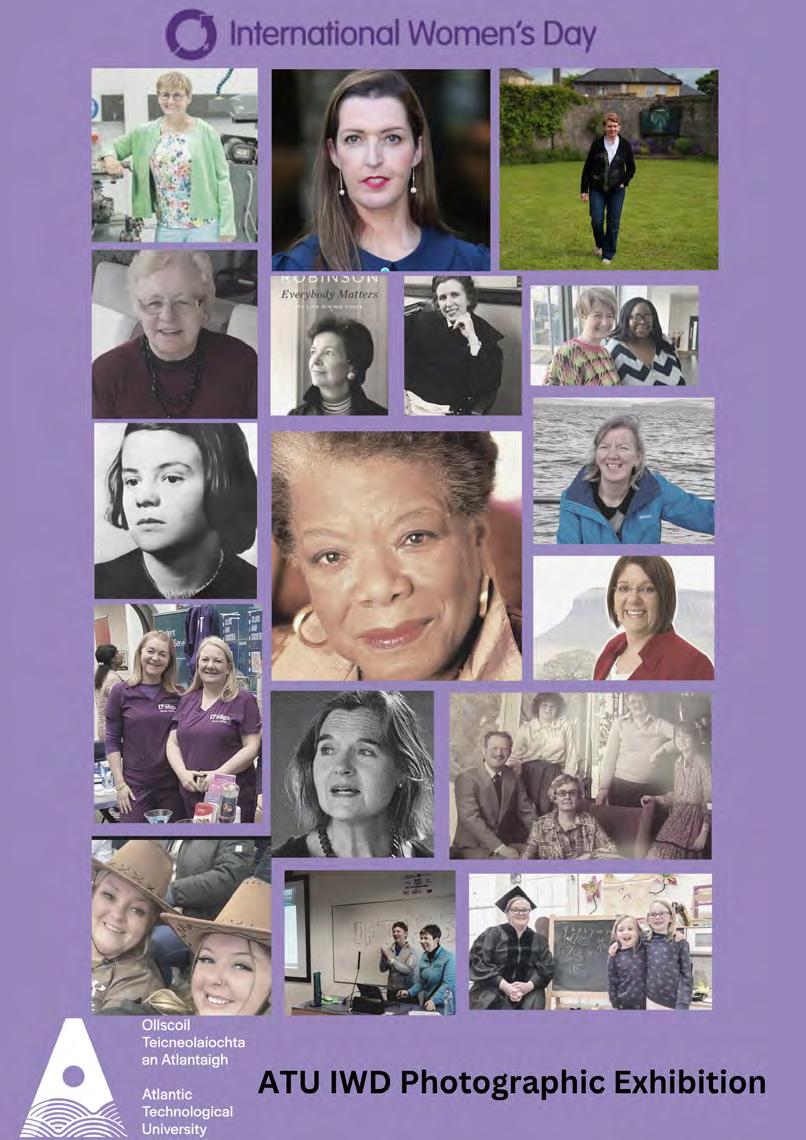
THE FUTURE IS HERE Issue Six March 2023 | 28
Equality, Diversity and Inclusion in the Art Classroom

Dr Dominic Thorpe recently delivered an Equality, Diversity and Inclusion workshop to students on the Bachelor of Education in Art and Design & Communication Graphics programme. These students are studying to be teachers of Art and Design and Communication Graphics.
Dominic is a board member of KCAT, a multi-disciplinary Arts Centre in Callan, Co. Kilkenny, dedicated to the fostering and nurturing of creative ambition and professional development in the arts.
During the workshop Dominic engaged the students with artworks from KCAT, taking them through the difficulties experienced by
artists with disabilities in relation to equal access to educational opportunities. He also advised the students on strategies of approach for teaching students with different abilities in the Art classroom. He gave examples of art projects examining diversity and inclusion, encouraging the students to develop greater awareness on these issues.

ATLANTIC TECHNOLOGICAL UNIVERSITY MAGAZINE 29 | Issue Six March 2023
Innovation and Engagement
ATU Innovation Hub (iHub) Client Success Story OneTouch Health
The growth of OneTouch Health from a technology in the ATU Innovation Hub (iHub) in Galway into one of the largest home care management software providers in less than a decade, with offices and teams in Ireland, the UK and Brazil, is a genuine success story. In that short time, they have developed what many regard as the most feature-rich singleplatform care management system for medium and large care organisations, including more than half of Ireland’s care providers and some of the UK’s best.
Dermot Clancy, CEO of OneTouch Health, and his colleagues talk to us about their success.

How did OneTouch Health start and where did the idea for the business came from?

Dermot Clancy, CEO: It came from me wanting to reduce isolation of elderly people and connect families with their loved ones using digital tablets. That led us into working with care providers who quickly made it clear that their biggest need was to run their companies more efficiently. So, although reducing isolation was still necessary, it wasn’t their biggest pain point. I realised we could help so I launched a company that is now OneTouch Health and we started working with more care providers to
expand the platform based entirely on care provider’s real needs.
Eamonn O’Donoghue, Business Development Director: I’ve been involved with the creation of the business since its days in the ATU iHub where there was five of us, then seven of us in one room. Then we had to get two rooms. Now we have several offices in several locations. And we are only just getting started. I think we can be global players.
How does the One Touch platform work and what differentiates it from other platforms?
Finin O’Connor, Chief Commercial Officer: The platform works by having all the features and functions that a care provider needs all in one place, behind one login. The manager at head office can manage everything from schedules, HR, care plans, everything, all in one place, and all accessed centrally from their computer. Then they
can share the relevant information out to the care staff working in the community. You can share the same information from the same platform with the family or with the service user where needed.
What is OneTouch Health’s mission and how will you achieve it?
Dermot: Our mission is straightforward: to help care providers to provide a better quality of care for their service users. We provide a platform that enables them to run their care companies more efficiently. The overall goal is to make care management more manageable for companies and then in turn allowing them more time delivering actual care. The efficiencies of going digital, reducing paper, being more considerate about our environment are all important but they all come about when you set out to make care management more manageable. Click here to find out more about OneTouch Health
THE FUTURE IS HERE Issue Six March 2023 | 30
Members of the OneTouch Health Team.
Photo: Feidhlim Lally.
This is an extract from a longer interview which was first published in Home Care Insight Magazine, January 2023.
How to Break into Human Resource Management and get Promoted
Working in Human Resource Management (HRM) the dynamic nature of the job
ATU reached out to local business and industry including employees wishing to upskill or change careers on Friday, 10 March with a HRM networking event on its Mayo campus. Prospective and current students also attended.

Representatives from Boston Scientific, Hollister Ulc, Ireland West Airport, Portwest, Collins McNicholas Recruitment & HR Services Group and People Matters participated in panel discussions on HRM and how employees can move into HRM roles.
Discussion topics covered included advice on how to transition to HR work, the key skills and attributes sought by companies, advice on CV preparation and interviews, and on how to move up the corporate ladder.
“Supporting part-time learners and talent development in this region is of paramount importance to the new university, specifically in the continually evolving areas of human resource management.”
Dr Seamus Lennon, Head of School of Business, ATU Galway-Mayo
Recognising the importance of providing educational opportunities for those wishing to work in HRM, ATU commenced delivery of a Bachelor of Arts Honours programme in HRM on the Mayo campus earlier this academic year. The formal launch took place at the HRM networking event.

Speaking about the new programme, Caroline Clarke, Programme Chair, ATU GalwayMayo, said: “The programme is delivered over two days a month on the Mayo campus and is
supplemented with online supports and two residential weekends. It is designed in this way so that busy working people can combine both their work and study commitments.”
The programme is accredited by the Chartered Institute Personnel of Development (CIPD) and graduates will be eligible for Associated Membership of the CIPD.
“This programme has been developed in response to a regional need and will develop HR managers and practitioners in both the private and public sector. We have listened carefully to employers and as a result the programme is focused and applied to achieving positive results in the workplace.”
Michael Gill, (pictured below) Head of Department of Organisational Development, ATU Galway-Mayo
ATLANTIC TECHNOLOGICAL UNIVERSITY MAGAZINE 31 | Issue Six March 2023
ATU Supports Growth Within the Blue Economy
Ireland’s only dedicated Blue Economy Cluster explored the potential of the western seaboard at a recent meeting in Killybegs between Industry, Enterprise Ireland and ATU.

Members of the Cluster shared views on the opportunities for collaboration through unlocking the true potential of Ireland’s blue economy with an emphasis on both sustainable proteins and renewable energies.
Dr Orla Flynn, ATU President, supported by Dr Rick Officer, VP for Research & Innovation at ATU, welcomed Leo Clancy, CEO, Enterprise Ireland to Killybegs. Karl
Bonner, Killybegs Marine Cluster Manager, outlined the four strategic pillars progressed by the Killybegs Marine Cluster over the last 2 years:
1. Internationalisation, Scale and Competitiveness
2. Fostering Skills and Talent
3. Research, Development and Innovation (RDI)
4. Developing the wider marine ecosystem
Dr Orla Flynn and Dr Rick Officer both expressed ATU’s commitment to support the growth within the blue economy along the west and north-west coast of Ireland.
Killybegs is ideally positioned to help realise the potential of the marine environment based on several factors: Killybegs Port has 12 metres water depth, heavy lift port infrastructure, and some 350+ highly skilled marine engineers available on the ground.
The marine industry in Killybegs has also a proven track record within the oil and gas industry – having previously serviced the largest offshore marine construction project in the history of the State, the Corrib Project.

THE FUTURE IS HERE Issue Six March 2023 | 32
Left to right: Meablh Conaghan, Regional Director West and North West Regions at Enterprise Ireland; Leo Clancy, CEO Enterprise Ireland; Dr Orla Flynn, President ATU, Dr Rick Officer, Vice President for Research and Innovation ATU; Kevin Mc Shane, Enterprise Ireland; Karl Bonner, Killybegs Marine Cluster Manager and John Andy Bonar, VP for Research, Equality & External Affairs at ATU.
About the Killybegs Marine Cluster
The Killybegs Marine Cluster is an industry-driven marine cluster that aims to build capacity with businesses working within the blue economy. It is one of twelve clusters on the island of Ireland that are part of Enterprise Ireland’s National Clustering Programme. The Killybegs Marine Cluster has been in operation for two years and is currently funded under the Regional Technology Clustering Fund, (RTCF ).
To find out more about the Killybegs Marine Cluster, please click here.
Turning the Blue Economy green
The Killybegs Marine Cluster also has ambitions to help turn the Blue Economy green by embracing emerging renewable energy industries. Discussions are currently ongoing between industry and the wider stakeholders to adopt a sustainability charter for the port.
Due to the unique geography of Killybegs Port, positioned as it is near the continental shelf, Killybegs has immediate access to the highest offshore wind speeds in Europe.
Members of the Killybegs Marine Cluster; Sinbad Marine Services and the Killybegs Fishermen’s Organisation, along with Swedish Developer Hexicon, are jointly progressing the potential development of a 2GW Floating Offshore Wind farm.
This has the potential to generate double the electricity of Ireland’s largest electricity generating station.

ATLANTIC TECHNOLOGICAL UNIVERSITY MAGAZINE 33 | Issue Six March 2023
New Advancing Innovation in Manufacturing (AIM) Centre
Work has started on the new AIM Centre in Sligo. The new facility will focus on developing capability in cutting-edge manufacturing technology in companies across the north-west region.

This innovative project is driven by ATU, Sligo County Council and Leitrim County Council and is supported by the Department of Enterprise Trade and Employment administered through Enterprise Ireland.
Minister of State for Trade Promotion and Digital Transformation, Dara Calleary, turned the sod on the site in March of this year.
Speaking at the event Minister Calleary said: “This is an ambitious, innovative project that will provide companies across the north-west with access to new and emerging manufacturing and supply chain management technology. There is a technological revolution occurring in this important sector and it is vital that Irish enterprise is ahead of the curve in adapting to change. As well as helping businesses adapt and become more competitive, projects such as this are crucial if we are to develop a resilient enterprise ecosystem to provide high-quality jobs and employment opportunities for people to live and prosper in all regions.”
Recently appointed director of the AIM Centre, Julie Dowling said: “It is fantastic to see the renovation work on the old fire station commence. Whilst we await the use of our state-of-the art facility, several cutting-edge projects are already in-flight with businesses in the region. Currently the AIM team are operating out of Sligo ATU Innovation Centre. We have a team of experienced resources in the fields of artificial intelligence and analytics, robotics and automation, business strategy, research and engineering. Businesses are under pressure with ever changing landscapes brought about from Brexit and COVID-19, followed by an energy crisis, global inflation, and talent retention issues. New technology can assist organisations with such challenges, and the AIM centre has the resources to help find the optimal solution for them.”
THE FUTURE IS HERE Issue Six March 2023 | 34
Manufacturing is undergoing a technological revolution with tens of thousands of jobs at stake across our region. ATU is delighted to collaborate with Sligo County Council, Leitrim County Council and Enterprise Ireland in taking this initiative to help our companies address that challenge, drawing on the expertise and facilities across all ATU campuses and partner networks across the country and beyond. It’s about putting knowledge at the service of the region.”
Dr Chris O’Malley, Vice President of Research, Innovation and Engagment, ATU
Minister Dara Calleary launches the commencement of work on the new AIM Centre in Sligo.
ATU to Benefit from €217m investment for Ireland’s Northern and Western Regions
On 25 January the Northern and Western Regional Assembly (NWRA) launched a new six-year investment programme totalling €217m in European Regional Development Funds (ERDF) for Ireland’s Northern and Western region.
Money from the programme will be spent on projects such as building the capacity of ATU to support regional research, capacity building and innovation; supporting regional industry with enhanced financial supports through TU Gateways (Enterprise Ireland) and helping regional enterprises to pursue further commercialisation of products and services.
The European commission recently classified our region as one in transition. This funding will help make our region smarter, greener, and an even more wonderful place to live.
The impact of the funding for ATU includes enabling the university to extend Research and Innovation (R&I) capacity across all campuses; extend and incentivise R&I engagement; distribute R&I
leadership and responsibility; create a sustainable and scalable model for R&I; leverage outcomes of past investments; and leverage external funding and collaboration.
Speaking at the launch, hosted in the Portershed, Galway, Director of the NWRA, David Minton, said: “The €217 million investment in the Northern and Western Region from the European Regional Development Fund (ERDF) is a welcome one. Partnerships with our EU colleagues have helped improve almost every aspect of life in our region over the past half-century. We have seen the ways in which we work, travel, and conduct business become more efficient. We have also benefited from regulations that have ensured the sustained quality of our environment and reaped the rewards of a wider array of opportunities for learning and development.”
“The EU has always been a major contributor to our economy. We are excited to be working with our government partners to deliver this significant investment, which underlines our ambition to be more competitive, more specialised, more urban and more green. It’s an investment in our young people, our talent, our educational institutions, and our towns.”
David Minton, Director of the NWRA
Full details of the programme are available here and will include:
• Delivery of a regional smart hub network for research, training, innovation and commercialization
• Underpinning the region’s existing enterprise ecosystem with training and innovation supports
• Working with SEAI to ensure households get deep energy retrofits
• Addressing the high rate of derelict and vacant properties in the region
ATLANTIC TECHNOLOGICAL UNIVERSITY MAGAZINE 35 | Issue Six March 2023
“Universities provide cutting-edge and applied research which ‘fuels’ the knowledge economy; we educate researchers, entrepreneurs, and innovators who drive it; and we are a magnet for attracting talented people into our region. We understand the distinct regional challenges across the entire Northern and Western Region, and our presence is wide and deep. As a region we need to do more. More partnership, more collaboration and more innovation. The new ERDF Programme can be a catalyst for achieving this, with investments to drive forward regional capacity.”
ATU President, Dr Orla Flynn speaking at the launch of the NWRA new six-year investment programme.


THE FUTURE IS HERE Issue Six March 2023 | 36
Dr Orla Flynn, ATU President at the launch of the NWRA new six-year investment programme.
Photo: Andrew Downes / XPOSURE.ie
ATU Collaborates with Local and Regional Bodies to Reduce Alcohol Harm
ATU researcher and lecturer Dr Grainne Ketelaar is collaborating with bodies such as the Alcohol Forum Ireland and the Irish Community Action on Alcohol Network on several projects aimed to reduce alcohol harm and deaths.
One such project is the Alcohol Researcher- Community Links Project (ARCL), which was funded by the New Foundation Award from the Irish Research Council (IRC). The project recognizes the work carried out by academic researchers, and by people working in the frontlines and dealing with the individual and community impacts of alcohol harm. The rationale for this project was to bring these diverse groups together to learn about each other’s work and experiences and to develop ideas for collaboration.
The IRC funding will be used to host a series of events throughout the year. Two Knowledge Exchange Events and a one-day Symposium are being held at each of the ATU campuses. The first event of the ARCL project took place in ATU Galway campus.
Representatives from the HSE, the Local and Regional Drug & Alcohol Taskforces, Healthy Cities initiatives, Healthy Campus, Health Research Board, and undergrad and postgrad students attended the event. It was a huge success and is helping build collaborative research community networks.
The ARCL project has increased public awareness of alcohol harm and the aggressive tactics the alcohol industry uses to sustain consumption and increase profits, irrespective of the costs of alcohol harm to individuals in Ireland.
In addition, the collaboration between the Alcohol Forum Ireland and ATU Donegal has resulted in the development of new programmes at ATU. They include an MSc in Therapeutic Interventions in Alcohol & Other Drugs; a Level 9 Minor Award in Children & Families: Hidden Harm; and a Level 7 Certificate in Alcohol Licensing. ATU are currently developing a Level 7 Certificate in Building SAFER Communities, based on a collaboration between ATU, and the World Health Organisation (WHO) European Region.
ATU are taking a proactive role to help reduce alcohol deaths and harm in Ireland. Alcohol use adversely impacts our healthcare system and our communities. Sexual assault, domestic violence, suicide and self-harm, road deaths, cancer, liver disease, FASD and harrowing addictions are all outcomes of consuming too much alcohol. It’s vitally important that we continue to fight for safer consumption of alcohol.”
Dr Grainne Ketelaar, ATU
About Dr Grainne Ketelaar
Dr Ketelaar presented a paper at the 2020 Global Alcohol Alliance Policy Conference. She also secured President’s Awards for three Masters by Research projects, two of which involve alcohol related topics – ranging from a focus on schools based preventative programmes to online alcohol sales. She continues to work with the Alcohol Forum and the Irish Community Action on Alcohol Network on community mobilization initiatives to tackle alcohol harm.

ATLANTIC TECHNOLOGICAL UNIVERSITY MAGAZINE 37 | Issue Six March 2023
Northern and Western Region to benefit from €5.4m European Digital Innovation Hub
Our region’s new European Digital Innovation Hub will ensure that our SMEs remain competitive in the changing business and technology landscape.
ATU has led a region wide consortium that has secured Government support for a European Digital Innovation Hub (EDIH) with €5.4 million in funding for SMEs in the northern and western region of Ireland that are embarking on digital transformation.

The hub, which is called Data2Sustain, has the potential to support regional SMEs and public sector agencies with the funding spread over three years. It also connects the region to a network of over 200 EDIHs across the EU.
EDIHs are one-stop shops supporting companies to respond to digital challenges and become
more competitive. They combine the benefits of a regional presence with the opportunities available to a pan-European network that can exploit radical disruptions in advanced digital technologies, such as Artificial Intelligence, Robotics and Blockchain technologies. Client companies and public services will be able to get advice on how they can make more effective use of data, how they can access finance to help to do it, and will also be able to get support free of charge or at high rates of discount in upskilling their staff and to have solutions using digital technology developed that are adapted specifically to their needs. These services will be made available across the full geographic footprint of ATU.
The majority of Irish small and mediumsized enterprises (SME) have little knowledge of the requirements of digitalisation and are hesitant to embark on their own digital innovation projects. We are enabling businesses to gain better access to data or use solutions powered by artificial intelligence. The programme also invests to ensure that our regional talent can get the right skills to actively participate in the labour market. The aim is that everyone in the region –citizens, businesses, and public services –can benefit from marketready technological solutions.
Chris O’Malley, VP, Research, Innovation and Engagement, ATU
THE FUTURE IS HERE Issue Six March 2023 | 38
”
Sligo.
Pictured at ATU Sligo for the launch of the new European Digital Innovation Hub (EDIH) called Data2Sustain left to right: Allan Mulrooney, interim CEO, Western Development Commission; David Minton, Director, Northern and Western Regional Assembly; Helena Deane, West Regional Enterprise Plan; and Chris O’Malley, VP, Research, Innovation and Engagement, ATU. Photo: James Connolly
Europe’s First End-to-End Sterility Assurance Postgraduate Certificate Launched at ATU
Hildegarde Naughton, Minister of State with responsibility for Public Health, Well Being and the National Drugs Strategy launched Europe’s first Postgraduate Certificate in End-to-End Sterility Assurance on Friday, 24 February. The certificate was developed by Irish Medtech Skillnet in partnership with Skillnet Ireland, the Irish Medtech Association, and ATU.
The partnership between Irish MedTech Skillnet, Skillnet Ireland, and the Irish Medtech Association, as well as the accreditation by ATU (Level 9) highlights the collaborative efforts of industry and academia in developing the highest standards for the sector and reinforcing Ireland’s reputation as a global leader in medtech.

“The launch of this new postgraduate programme in sterility assurance from Irish MedTech Skillnet in partnership with ATU is hugely significant for the Irish medtech sector. It demonstrates the power of industry and academia collaborations in meeting the fast moving technological and regulatory trends of the medtech sector. This programme, the first of its kind in Europe, further enhances Ireland’s reputation as a top global medtech hub.”
Paul Healy, Chief Executive Skillnet Ireland
Dr Ann O’Connell, Head of Funded Projects, Ibec Medtech and Engineering, said: “This innovative blended learning programme will offer science and engineering graduates and people already working in the area an incomparable opportunity to attain an accredited qualification in the essential area of sterility assurance.”
“The medtech industry adheres to international standards for sterilisation methods and test methods. This one year programme developed by the Irish MedTech Skillnet and Irish Medtech Association in partnership with ATU will help students understand applied methods across a range of context with key topics such as microbiology, biocompatibility and cleanroom operations.”
ATLANTIC TECHNOLOGICAL UNIVERSITY MAGAZINE 39 | Issue Six March 2023
“I am delighted we have partnered with colleagues in Irish Medtech Skillnet, Skillnet Ireland and Irish Medtech Association to deliver this much needed programme in End-toEnd Sterility Assurance. It is an example of how ATU works with industry to meet both regional and national needs, providing skills in high demand that permit our partners to remain competitive and grow employment.”
Dr Eugene McCarthy, Head of Department of Analytical, Biopharmaceutical and Medical Science, ATU
Pictured left to right at the launch: Dr Eugene McCarthy, Head of Department, Dept in Biopharmaceutical and Medical Science, ATU; Dr Sinead Keogh, Head of Sectors and Director Ibec Medtech & Engineering Sectors; Dr Orla Flynn, President of ATU; Hildegarde Naughton Minister of State at the Department of the Taoiseach and at the Department of Health; Dr Ann O’Connell, Head of Funded Projects Medtech and Engineering, Ibec; and Paul Healy, Chief Executive Skillnet Ireland.
Developing Competency Training for Employees
How MyCareerPath.ie can help you
Competency training is key to employee development and is an important part of any successful business. It helps ensure that employees are up to date on the latest techniques and methods needed to excel in their roles. ATU’s MyCareerPath.ie is a service that will help you streamline staff training and development to ensure your organisation meets its future skills needs. Here is how MyCareerPath.ie can develop effective competency training for your employees:
1. Skills Audit: The MyCareerPath team meet with T&D or HR Leads to understand the training needs of your business. We help identify both current and future needs to help protect against skills deficits.
2. Strengths Assessments: We work with your employees to identify their strengths, weaknesses and motivations, and to help them understand their working and learning styles. They gain awareness of areas for improvement and how to use their strengths to reach their full potential.
3. Identify key competencies: We help your employees identify the key competencies they need to be successful in their roles. These can include technical skills, communication skills, critical thinking skills, and more. We assign them a MyCareerPath Career Guidance mentor to help them understand the link between competency development and internal progression.
4. Develop a training plan: We develop a plan for each employee that outlines the training topics, duration, and resources needed to progress their competencies. All employees gain access to our e-learning platform as well as a list of on-the-job training tasks set by their MyCareerPath mentor.
5. Provide feedback: The MyCareerPath mentors regularly provide feedback to your employees on their progress. This will encourage them to develop their skills further and maintain focus on their goals.
6. Monitor progress: We monitor the progress of your employees to identify any areas where additional training may be needed.
7. Additional skills development: Where an employee needs to upskill or reskill to meet company or personal career goals, we guide them through the process of identifying a third level programme that will meet their needs. We also work with the ATU Recognition of Prior Learning team to help employees understand how their prior learning can help them access higher education.
8. Celebrate success: We recognise your employees’ achievements and celebrate the progress they have made in their competency development by providing all employees with a certificate of completion once they have met their training goals.
If you would like to find out more about how MyCareerPath can help your team meet their training goals, please contact industryliaison@atu.ie
THE FUTURE IS HERE Issue Six March 2023 | 40


ATLANTIC TECHNOLOGICAL UNIVERSITY MAGAZINE 41 | Issue Six March 2023 ATU
Colleagues at the launch of MyCareerPath.ie
ATU Celebrates
ATU marks 50 years of Toolmaking
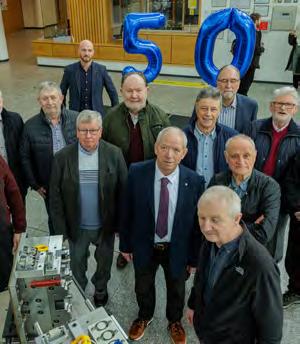
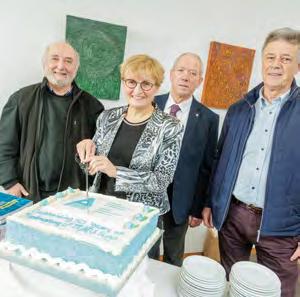
Over 50 years ago, Sligo RTC (now ATU) opened its doors to students with a focus on providing highquality education in engineering and technology. Amongst the various fields of study, a toolmaking programme was established to provide apprentices with hands-on experience in creating, designing and fabricating various precision engineering tools and components. Fast forward to today, the toolmaking programme at ATU has become one of the most sought-after programmes, attracting apprentices from all over the country and further afield.
To celebrate this historic milestone, ATU hosted a 50th anniversary celebration. The event was attended by alumni, industry members and staff both retired and present. The celebration included tours of the toolmaking workshops, demonstrations of the latest equipment and techniques, and a presentation on the achievements and contributions of the Toolmaking programme in the region over the past 50 years.
in the achievements and success of their graduates.”
Úna Parsons, Head of College and Head of Faculty of Engineering & Design, ATU Sligo
One of the highlights of the celebration was the reunion of the alumni of the Toolmaking programme. Many of them had not seen each other in decades and used the opportunity to reminisce about their time in college.
Úna Parsons, Head of College and Head of Faculty of Engineering & Design at ATU Sligo was one of the first female apprentices in Toolmaking in Ireland coming to Sligo from her native Dublin in 1978. From there Úna established an outstanding career which sent her around the world and eventually back to Sligo as Head of College some 45 years later.
“Sligo has become the National Centre of Excellence for the trade of Toolmaking since courses began here over 50 years ago. Back then the staff here recognised there was a gap and so developed a syllabus that dealt specifically with the trade of Toolmaking. The first group of apprentices started their block release in September 1972.”
Padraig McGarry, Head of Department of Engineering Technology, ATU Sligo
THE FUTURE IS HERE Issue Six March 2023 | 42
The Toolmaking programme has evolved with the times and has adapted to the changing technological advancements, offering the latest equipment and techniques to the apprentices. The faculty and staff at ATU have always been dedicated to providing the best education possible, and this has been reflected
ATU Lecturer Selected to be the First Recipient of the Heaney-Miłosz Residency
Alice Lyons, a lecturer in writing and literature at the Yeats Academy of Arts, Design & Architecture at ATU Sligo and author of three poetry collections and one novel, has been selected as the first writerin-residence of the new HeaneyMiłosz Residency.
As part of the Heaney–Miłosz Residency, Alice will stay in the former apartment of Polish poet and writer Czesław Miłosz in Krakow for four to six weeks next Autumn. She has been to Poland several times and many of her poems have been translated into Polish, appearing most recently in publications such as Czas Literatury and Tygodnik Powszechny.
The Heaney–Miłosz Residency aims to support writers, resident in Ireland, who are at the early to mid-stages of their careers. It is

intended that the residency period will provide writers the space and time to develop their work in the beautiful surroundings of Krakow city.
During the residency period, Alice will have the opportunity to take part in a variety of events and meetings with representatives of the creative and literary community in Krakow. At the end of the residency, she will provide a written reflection on their experience in Krakow.
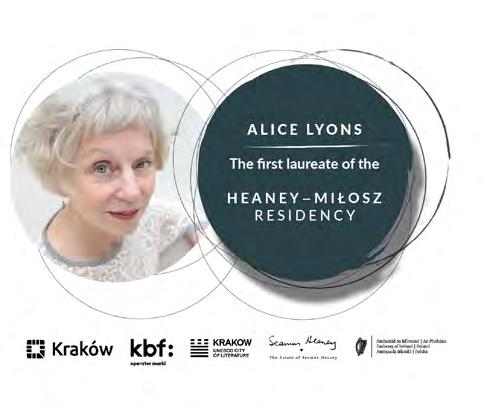
Welcoming her selection, Chris Heaney, of the Estate of Seamus Heaney, said: “We’re delighted that Alice Lyons will be the first recipient of the Heaney-Miłosz Residency, having been selected from a very strong field of impressive candidates. She has a longstanding and deep connection with Poland
and Polish culture, which has informed her work across various media, and we hope that the Residency will provide her with time and space for the development of her work.”
Awarded the Nobel Prize for Literature in 1980, Czesław Miłosz is one of Poland’s most outstanding writers. Described by Seamus Heaney as a “veteran of turmoil”, Miłosz experienced the devastation of war and occupation in Central and Eastern Europe. These experiences, as well as his Polish-Lithuanian heritage, shaped his writing. Seamus Heaney said of Miłosz’s work: “You are a slave to a unique voice, a poetry imbued with the density of experience that has been lived and radiated by an understanding that has made it symbolic.”
ATLANTIC TECHNOLOGICAL UNIVERSITY MAGAZINE 43 | Issue Six March 2023
Culinary Success
Congratulations to Karl McNulty (lecturer at ATU Killybegs) and Sean Bovaird (third year BA in Culinary Arts student) on their achievements at the prestigious Chef Ireland Culinary Competition 2023, in the RDS, at CATEX.
Both Karl and Sean entered the sugarcraft competition “Works in Petal Paste” and the “hand crafted chocolate” category with Karl winning a silver Medal (Sugarcraft) and a certificate of merit in the chocolate category.


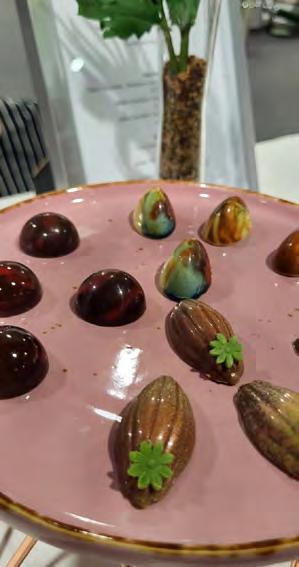
Sean obtained a certificate of merit for his sugarcraft submission and a silver medal in the chocolate category.
Also, congratulations to Aoife O’Donnell, third year Culinary Arts student, who obtained a silver medal in a team event, in the “Culinary Olympic team qualifier” category.
THE FUTURE IS HERE Issue Six March 2023 | 44
Recent Student Sporting Achievements
ATU Connemara All-Ireland Hurling Champions 2023
Congratulations, to the ATU Connemara Hurling team on their exceptional performance in the Fergal Maher Cup, All-Ireland Hurling Final in SETU in Waterford. The team were commanding from the start and overcame the Royal College of Surgeons with a score line of 5-17 to 1-10.
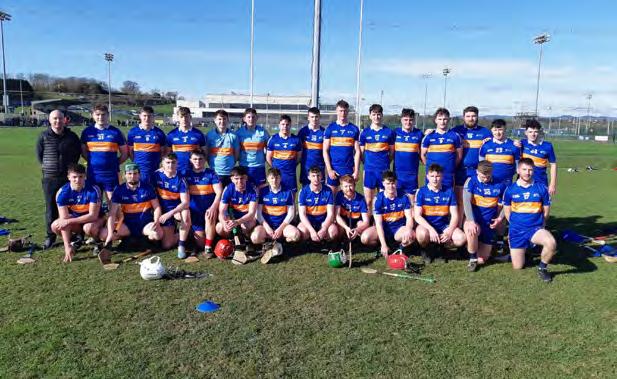
National Athletic Success
ATU Sports Scholar Lauren Cadden recently finished second in the 200m final at the National Senior Indoor Championships. The Sligo athlete ran a new personal best time of 23.97.

ATU Ladies Gaelic Football Teams Success
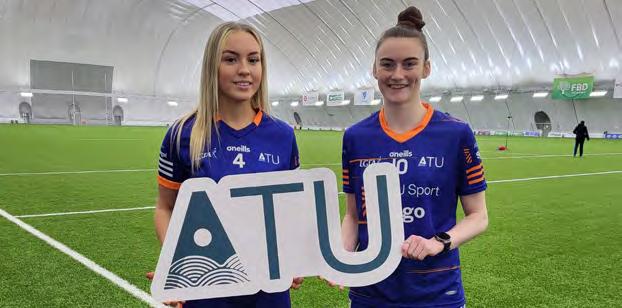
ATU Donegal won the Lynch Cup in the Yoplait LGFA HEC Championship, hosted by ATU Sport in March. With a fantastic display of skill and determination they overcame UCC with the final score of 1-11 to 1-06.
Commiserations to ATU Sligo who narrowly missed out on winning the Moynihan Cup Final, losing to DKIT by a single point 0-11 to 2-06.
Pictured above are Laura Martin (ATU Donegal) and Roisin Rodgers (ATU Sligo) at the launch of the championships at the GAA Centre of Excellence in Mayo.
ATLANTIC TECHNOLOGICAL UNIVERSITY MAGAZINE 45 | Issue Six March 2023
ATU Sport hosts the Yoplait LGFA HEC Championships 2023
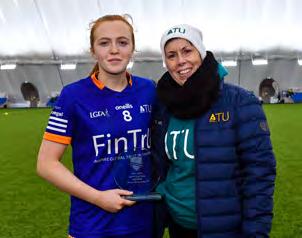


The Yoplait LGFA HEC championships took place this year in March at the Connaught GAA Centre of Excellence in Mayo. Congratulations to all who took part. Here are some of the winning teams:

THE FUTURE IS HERE Issue Six March 2023 | 46
DCU Dóchas Éireann, Winners of the Yoplait Ladies HEC Cup Final. Photo: Sportsfile
TUS Midwest, Winners of the Yoplait HEC Donaghy Cup Final. Photo: Sportsfile
University of Galway, Winners of the Yoplait HEC Lagan Cup Final.
Photo: Sportsfile
Dr Orla Flynn, ATU President presents Ciara McGarvey (ATU Donegal) with her Player of the Match prize
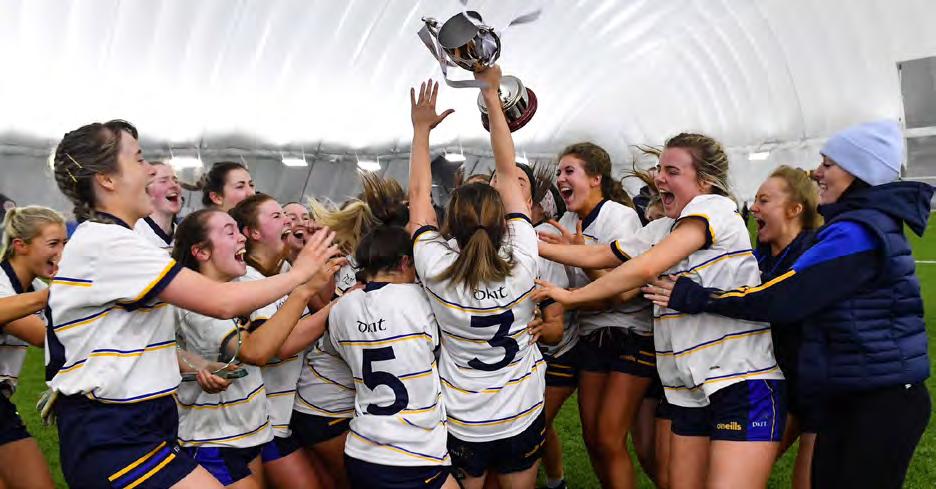


ATLANTIC TECHNOLOGICAL UNIVERSITY MAGAZINE 47 | Issue Six March 2023
DKIT, winners of the Yoplait HEC Moynihan Cup Final.
Photo: Sportsfile
DCU Dóchas Éireann, winners of the Yoplait HEC O’Connor Cup Final.
Photo: Sportsfile
ATU Donegal, winners of the Yoplait HEC Lynch Cup Final.
What’s happening in ATU Libraries
Diversifying our libraries
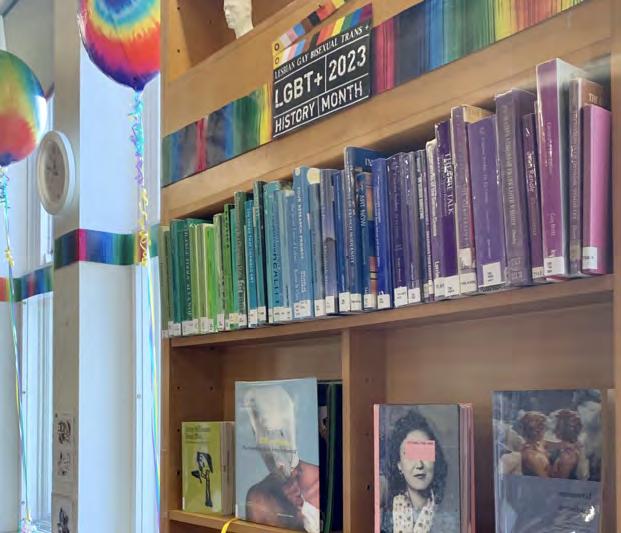
The purpose of diversifying ATU’s libraries is to ensure that people who are marginalised by society’s perspectives – for example, by race, ethnicity, gender identity and expression, sexual orientation, physical ability, or socioeconomic class – are better represented. In support of this aim ATU libraries recently purchased a new collection of books covering themes of quality, diversity and inclusion.
On 25 January, ATU Libraries in conjunction with the Equality, Diversion and Inclusion (EDI) office launched their new collection. This collection of almost 100 books and ebooks on all aspects of diversity was funded by the EDI Office and covers fiction and non-fiction on the themes of race, gender, ethnicity, LGBTQ+ and ability. The collection
shows the university’s commitment to having inclusive content that is representative of our diverse ATU community and provides a focus for students and staff to explore these themes.
“A few weeks ago, we celebrated Library Ireland week. The theme was “Libraries as places of sanctuary,” and I thought how appropriate and timely because libraries are neutral and democratic places. We welcome everyone and we are inclusive and diverse. Our new EDI-themed collection of books is available to all ATU staff and students.”

THE FUTURE IS HERE Issue Six March 2023 | 48
Margaret Waldron, ATU Galway-Mayo Librarian
This is an important initiative for the Equality, Diversity & Inclusion team, working with colleagues in ATU Library, as it contributes to creating a culture of representation in ATU. Creating a culture of representation requires habit; building a culture of representation requires effort and patience; and the purchase of and enabling ATU-wide access to this collection is part of that sustained effort.”
Mary Nestor, Equality, Diversity & Inclusion Manager
ATU Libraries celebrated LGBTQ+ History month in February.
Left to right: Mary Nestor, Equality, Diversity & Inclusion Manager, ATU Galway-Mayo; Sarah Mohan, SU VP Welfare and Colin Kearney SU President.
Lunchtime Library Talks
Save Our Swifts
In February ATU Library hosted the first university-wide library lunchtime talk. Lynda Huxley gave a talk on the Save Our Swifts project. You can watch the recording here.
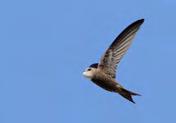
Folklore and Belonging
Continuing our series of online talks, ATU Fulbright Scholar Debra Shutika gave a talk on Folklore and Belonging highlighting the ways folklore shapes our sense of place and belonging and folklore’s place in a high-tech, often disconnected world.
ATU Galway Library celebrates International Women’s Day
Book Launch
To mark International Women’s Day on 8 March, ATU Galway Library hosted a talk by Donal Connolly and Brendan Gardiner on the extraordinary life of Aleen Cust, the first woman Veterinary Surgeon in the world.

Congratulations to ATU Library staff member Celeste Augé who recently published a new collection of poetry, I Imagine Myself. Click here to watch a recording of the launch.


ATU Library marks International Day of Women and Girls in Science
11 February was International Day of Women and Girls in Science and ATU Library Donegal celebrated two pioneers in their fields: Kay McNulty and Jocelyn Bell Burnell.
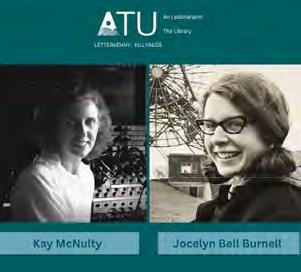
Kay McNulty was born in 1921 in Creeslough, Co. Donegal. She was one of the six original female programmers of the ENIAC, the world’s first general purpose computer.
Jocelyn Bell Burnell was born in 1943 in Lurgan, Co. Armagh. As a research student, in the astronomy department in Cambridge, she made one of the most significant astronomical findings of the century, the discovery of pulsars.
ATLANTIC TECHNOLOGICAL UNIVERSITY MAGAZINE 49 | Issue Six March 2023
Upcoming Conferences
DigitalEd Conference

Wednesday, 17 May 2023
This year’s conference will take place in ATU Galway campus and online. The conference will include keynote addresses from digital teaching and learning international leaders, Neil Mosley and Prof Gilly Salmon. In addition, a series of practice sessions will showcase Digital Transformation in Learning, Teaching and Assessment in Higher Education in Ireland. The conference is supported by the NTUTORR National Project.
Universal Design for Learning (UDL) National Conference


Hosted by ATU in collaboration with MTU
Thursday, 1 June 2023 in Hume Hall, ATU Sligo
This year ATU and Munster Technological University (MTU) have united to deliver a National UDL Conference. The conference will explore a whole Institute approach to UDL. It will also draw on learning and reflection from the HEA Path 4 Phase 1 Project in which both universities partnered on a work package which considered leadership approaches to supporting UDL. With increased evidence available on the effectiveness of UDL to create a more inclusive environment across classrooms in Further and Higher Education, the conference will explore UDL from three key perspectives: Leaders, academics, and student services. For more information and to book a seat please click here
THE FUTURE IS HERE Issue Six March 2023 | 50
At Atlantic TU we serve a diverse group of learners, staff, communities and organisations in the west and north-west and further afield. We offer a rich combination of academic and research excellence, quality of life and opportunity - all of which can be experienced in the most beautiful part of Ireland.
ATLANTIC TECHNOLOGICAL UNIVERSITY MAGAZINE 51 | Issue Six March 2023 THE FUTURE IS HERE
www.atu.ie @atu_ie
















































































































